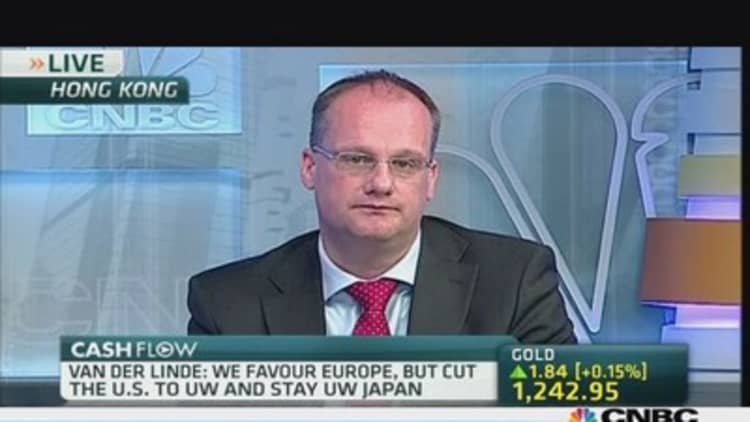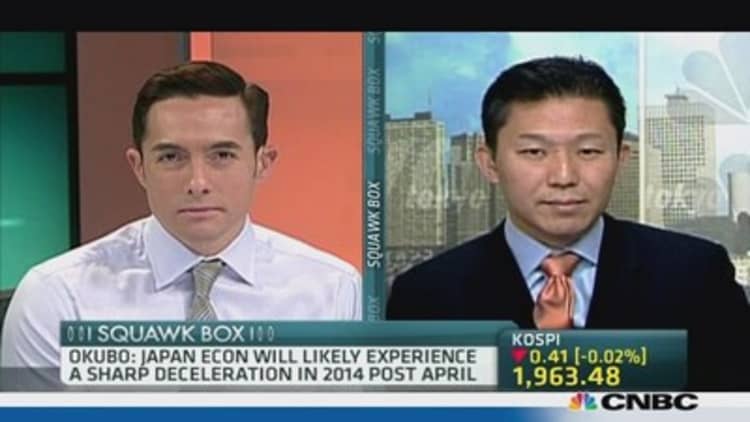
Going long on Japan's economic revival story has been the consensus call, but more analysts are beginning to see weak spots in the plot.
Even though Japanese shares rallied nearly 60 percent in 2013, most analysts still expect solid gains from the market this year, despite the Nikkei falling nearly 3 percent so far in January.
Investors have been holding out hope that Japan will finally succeed at its decades-long struggle against the pressures of deflation on its moribund economy.
(Read more: Japan's rocky January doesn't deter bulls)
Abenomics – a series of policy measures, called "arrows," unveiled under Prime Minister Shinzo Abe to jump start the economy – has seen some success. In November, the country posted a 1.2 percent on-year rise in inflation, marking a five-year high.
But some aren't sure the recovery story will play out according to script.
The first two arrows, "monetary policy, fiscal stimulus, that's all worked out," said Herald van der Linde, head of equity strategy at HSBC. "That third arrow, we haven't seen anything yet," he told CNBC.
"We need to see more proof that structural reform is taking place," he said. "I understand corporates are maybe considering increasing wages, but we don't see any particular signs of this yet. I think it will be actually quite difficult to implement some of these reforms," he added.
"There's a high expectation that all of these reforms will be implemented at some point in time. If that's going to be a disappointment, that will be quite negative on equities," he said. "Most of the world is heavily overweight. If there is going to be a margin of error here, or a disappointment, we could see a bit of a rush to the exits."
Others point to the looming consumption tax hike to 8 percent from 5 percent, set for April, as having the potential to derail the country's nascent recovery.
(Read more: Japan's tax hike won't hit all retailers equally)
"With the consumption tax rate hike, people are going to suffer negative wage growth and that will have a consequence on the economy," said Takuji Okubo, chief economist at Japan Macro Advisors.
Okubo also wasn't certain Abenomics has successfully driven up domestic demand.

"Private consumption is actually doing crazy things," he told CNBC, noting it rose 3 percent last year. "Japan has a shrinking economy with a lot of elderly people. In natural way, consumption shouldn't be rising 3 percent. I would even call that a bubble already."
In addition, Credit Suisse expressed doubts about how successful the massive easing program from the Bank of Japan has been at creating inflation. According to its calculations, excluding the effects of import cost inflation largely driven by a weaker yen, November's "underlying inflation" would actually have been a decline of 0.2 percent.
(Read more: Buy Japan exporters on weak yen? Not so fast)
"The recent acceleration in core CPI (consumer price index) inflation is a temporary phenomenon attributable mostly to rising import prices or costs," it said in a note. "The broader economy remains under a deflationary pressure. In other words, there is still much to be done before a 'victory' over deflation can be declared with any real conviction."
Some are doubtful of whether promised wage increases will come through to bolster consumer demand, especially in the wake of the coming tax hike.
While Abe has signaled he believes a "wage surprise" is just around the corner, Capital Economics expects this will be a "damp squib."
"These are not the first annual wage negotiations under Prime Minister Abe," Capital Economics said in a note. "He encouraged employers to raise wages in last year's round too, with limited success. While business conditions have certainly improved since then, we struggle to see why his exhortations should have much more impact this time around."
(Read more: Is the honeymoon over for Japan equities?)
It noted Japan's trade unions have limited clout, with employee membership below 20 percent, and struggle to hold employers to agreed wage increases.
—By CNBC.Com's Leslie Shaffer; Follow her on Twitter @LeslieShaffer1

